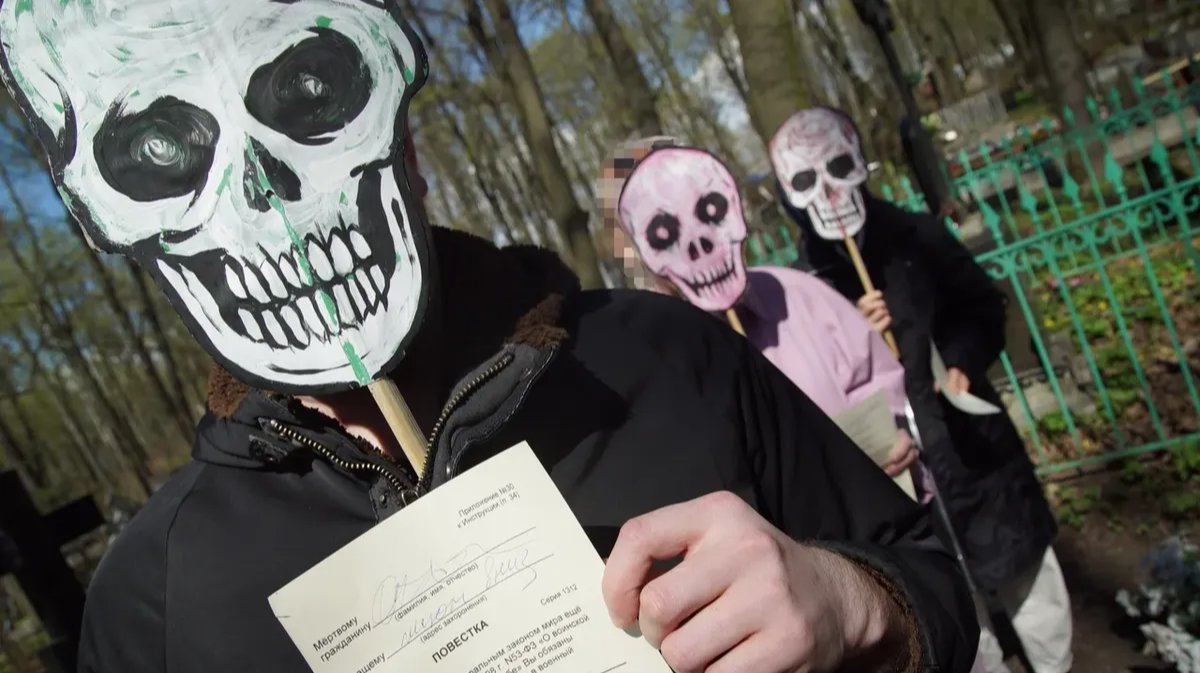The homes of Saint Petersburg activists from the so-called Party of the Dead (PotD) were searched last week by the Investigative Committee and the FSB. All the activists were declared witnesses in a case of “insult to the feelings of believers”. The artists say that the law enforcers were acting harsh, threatening to throw them to the floor while searching their apartments. The law enforcers created a mess in each apartment, inspecting every book and personal item meticulously. The formal reason behind the search was the group’s post on VK, Russia’s largest social media platform, about their anti-war performance at the local cemetery which occurred on 28 April.
PotD has called the search an act of intimidation. They are surprised that the group members are being persecuted for “insulting the feelings of religious believers”, says Maxim Yevstropov, the project’s founder. The group did several anti-war performances even prior to 24 February, the day when Russia’s full-scale invasion of Ukraine began, so they thought “discrediting the Russian army” or “spreading fake news” charges would have been more likely. Novaya Gazeta. Europe has spoken to the members of the Party of the Dead about the search, their protest, and the dead’s attitude towards the war.
It was revealed that Russia’s authorities are now “chasing the dead” on Thursday when the group’s Telegram channel posted that Kristina Bubentsova, an activist, had her apartment searched, same as Olga Tsaplya, Dmitry Vilensky of a separate art group, and one more unnamed woman who the FSB considered a VK group admin. Human rights activists who helped the group later told the media that the law enforcers had also tried to search the house of Maxim Yevstropov who left Russia long ago, and some other people, too. PotD says that none of the people listed above had direct connection to their group, though.
The post that triggered the criminal procedure was published on the last Sunday of April, the Orthodox Easter; it told the group’s followers that an anti-war performance titled Easter at a Russian Cemetery had been held recently. Pictures attached to the post showed an anonymous artist wearing a black robe, its hood covering his face. The artist held posters that read: “Russia will resurrect, and it’s going to be a free country”, “Stop the war, Russia’s soldiers will never resurrect”, “Jesus Christ has resurrected; conscripts never will” and “Stop the war. Civilians will never resurrect.”
“Jesus Christ has resurrected; conscripts never will”
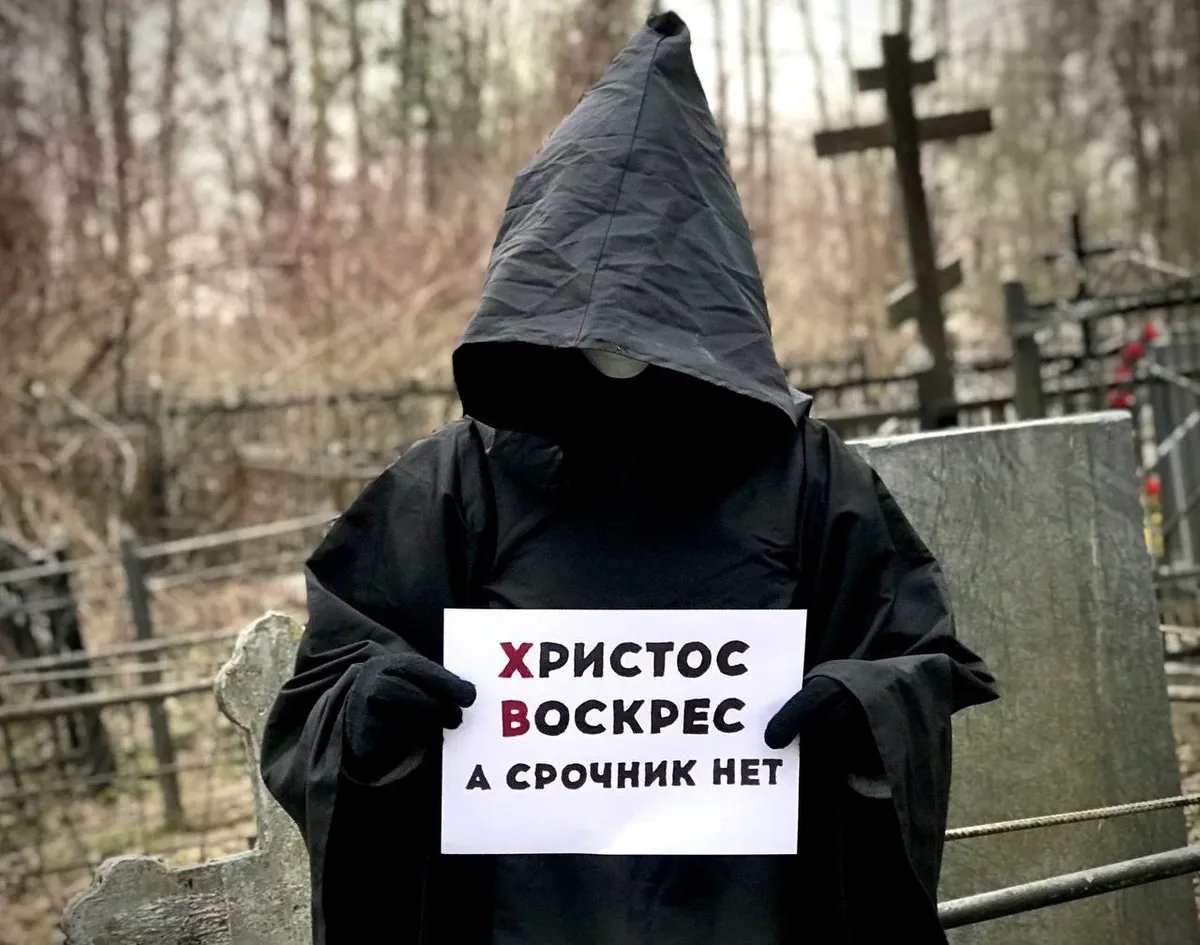
Source: vk.com/party_of_the_dead
“Patriarch Kirill of Russia’s Orthodox Church has given his blessing to the war, he thinks that destroying Ukraine’s cities, murdering civilians, raping women and looting people’s houses for the sake of some pseudo-imperialistic Z-fuckery against all God’s commandments is an OK thing to do,” reads the PotD’s post. Maxim Yevstropov suggested that it was the criticism towards Patriarch Kirill that triggered the criminal procedure. It turned out eventually that he was right: the law enforcers told the activists during an interrogation that an unknown man reported the publication to the Investigative Committee, which initiated a forensic analysis and ruled out that Christians in general and Patriarch Kirill in particular had been insulted.
Kristina Bubentsova of the PotD has told Novaya Gazeta. Europe that Maxim Yevstropov was of special interest to the law enforcers. “They said: We need Max, not you. You’re nothing, we need Max.” They also told Kristina that Yevstropov’s ex-wife Daria Apahoncic, also an artist, had been interrogated in a room next door by the Investigative Committee enforcers. Apahoncic is famous for becoming one of the earliest “foreign agents” in modern Russia’s history, which prompted her to leave the country.
“They lied to us for some reason, in fact, a totally different girl was held there. I don’t get it how they were going to reach Max or Daria through us, they know for sure that both are abroad,” Kristina says. “They also asked me if I’m acquainted with any other PotD members, they wondered if I could share their names. They we also curious if our ‘party’ had official branding, charter, official membership conditions, or foreign sponsorship. And they also asked me if I ever borrowed money from other PotD members. You see, we have no official members, anyone can join. We have some sort of a draft for our charter, yes, but we keep it incomplete deliberately so that we don’t become a real organisation. This is what they were actually trying to find, they wanted to recognise us as a real organisation. Maybe they are willing to declare us ‘foreign agents’ or an ‘undesirable organisation.’ So, then they started asking me about the war, we had a really long talk out there.
Then two FSB officers entered the room. They asked me if I thought they were fascists because I said during the search in my apartment that I consider them all fascists.
They also asked me if I thought what’s going on in Ukraine was war; I refused to answer. They filmed me with their phones and asked me more questions. Soon they left the room, I think they were disappointed, maybe because they wanted to frame us up for ‘discrediting the army’, otherwise PotD was of no interest to them. I’m afraid I will face persecution later again.”
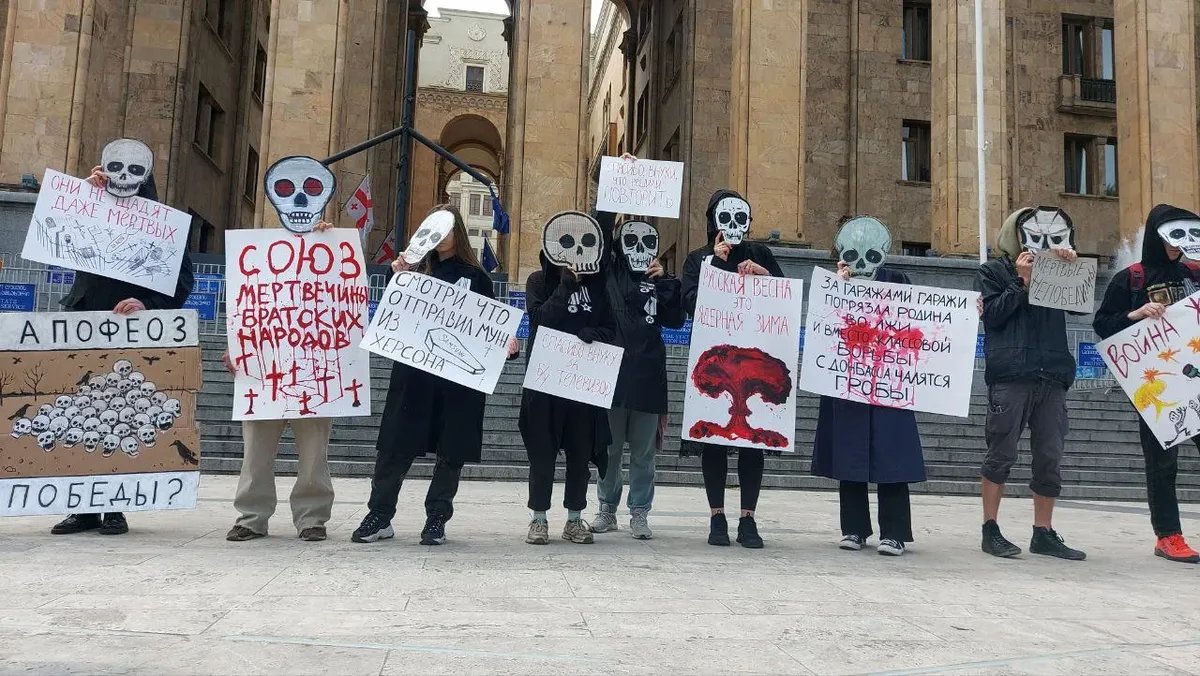
A performance by PotD in Georgian capital Tbilisi, source: vk.com/party_of_the_dead
Posters read, left to right:
They have no mercy even for the dead
The Apotheosis of Victory? [homage to The Apotheosis of War, a painting from the 19th century by Vasily Vereshchagin]
An undead union of fraternal peoples [a sarcastically modified mix-up of lyrics from USSR’s and Russia’s national anthems]
Look what my husband sent me from Kherson [his own dead body in a coffin]
Thank you, my dear grandson, for a used TV set
Thank you, descendants, for repeating this [a reference to a popular sticker many Russians glued to their cars in the early 2010s: a silhouette of a man with a Soviet coat of arms replacing his head raping a person with a swastika instead of their head from behind, the sticker read: “we can repeat this”] The Russian Spring is more like Nuclear Winter
Our Homeland has mired in lies / And instead of class struggle / We have coffins from Donbas
There is no defeating the dead.
A search in Kristina’s apartment was some rough action, she says. “The law enforcers arrived at half past 7; my husband had just left for work two minutes before that. They had been slamming my door for 20 minutes straight, so I had enough time to call my husband and OVD-Info (an independent human rights organisation aimed at combating political persecution — translator’s note). And then firefighters arrived, they carried axes, so when I saw them from my window, I decided to unlock that door. They had a search warrant that said law enforcers from the FSB and Investigative Committee would be searching my home. The warrant also allowed them to confiscate my technical devices that could be potentially used for posting to VK as instrument of crime. So, they confiscated all my phones, laptops, old USB drives… They took everything that looked like a computer-related device.
And then they started to turn my apartment into a mess for pure pleasure. They were mocking me. At some point they took my husband’s wooden sword and started playing with it like little kids. They threatened to cut my floor open and to destroy my suspended ceiling; they were acting really aggressively, and it all seemed so weird to me because we are more or less of the same age; I wondered what’s inside their minds. There was a guy who would look through every book of mine he considered provocative: those of gender, authority, or decoloniality, and he would take pictures of those books. They took my clothes bag and dumped out all my underwear out, they would also throw my makeup accessories into my bathtub, they would empty my cereal boxes, too. In fact, they emptied every shelf and every box in my apartment and threw the contents to the floor. And they would humiliate me all the time.
You see, we have a box with sex toys out there, so they would take them all out and ask me questions: ‘Is this yours? Does this thing fit inside you? What’s your gender?’
They told me I was meddling with their work and threatened to throw me to the floor. When I asked them at my interrogation why would they pressure a witness with a house search, they said: ‘It’s all legal. If I wanted to pressure a witness, I would stick a pistol to your head, and shoot it an inch away to scare you.’ Then they issued an interrogation notice for my husband and gave it to me. I asked them why they couldn’t summon me for interrogation this way, and they said it wouldn’t be as fascinating, and burst out laughing.”
‘Most of our party members are dead people’
Party of the Dead is an artistic activism project that was established in 2017. Its activists refer to the political and art routine of modern-day Russia as «necrophilic» since Russia’s authorities «monopolise the voices of dead people and speak on their behalf.» Putin’s regime, as PotD puts it, «treats everything as expendable supplies, namely the country’s soil, fossil fuels, the lives of its people or foreign citizens, and even the dead: for instance, when dead people ‘come’ to polling stations to vote.»
Maxim Yevstropov, the founder of PotD, has told Novaya Gazeta. Europe that he wasn’t surprised Russia’s law enforcers considered him their top target: “Their logic is that any organisation has a key figure, or a coordinator, as they put it. They think I am one probably because I have been in the spotlight more than anyone else. But we wish to be as informal, non-hierarchical and horizontal as possible.
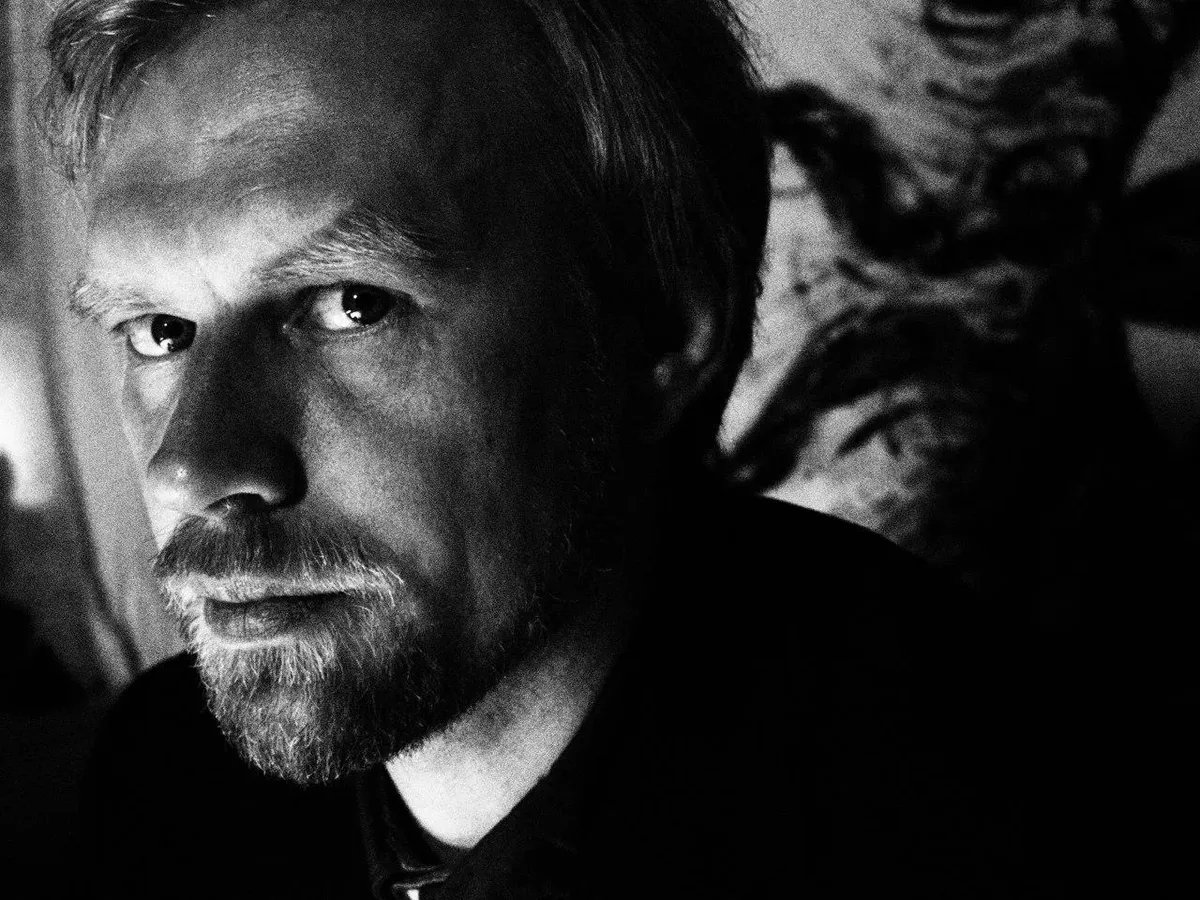
Maxim Yevstropov. Source: vk.com/ghostswalls
We have some sort of a charter draft as we call it. It’s not a real charter since a document becomes one when it’s ratified. Ratification requires support from most of the party members, but our party’s members are mostly dead people. So, it’s unclear how to ‘ratify’ such charter. Anyone can declare themselves our member and speak on behalf of PotD if they don’t violate our key principle: liberty, equality and mortality.
When I used to live in Russia, I knew almost every member of our community, but PotD turned into some sort of an affinity group when the Ukraine War started. So, now I’m not sure how many group members there are, who are those people, and sometimes I don’t even know who’s behind some of our performances. We often communicate with those people anonymously, they send us pictures via messaging services, and then someone posts those pictures online. If we talk about the post that triggered the criminal procedure, those were pictures from unknown people. I don’t know who took those pictures, as well as when or where they were taken.”
Maxim has no doubt that the ground for initiating the criminal procedure is but formality, in fact, the FSB is trying to intimidate the activists away from showing their anti-war stance. PotD has long been a risky affair he says, as its members were detained at anti-Putin rallies multiple times. Their first anti-war performance was held on 22 February, two days before the full-scale invasion started and on the same day Russia’s State Duma ratified the recognition of the so-called ‘DPR’ and ‘LPR’, two pro-Russian breakaway states in East Ukraine. The activists took to Piskaryovskoye Memorial Cemetery in Saint Petersburg where they displayed posters reading “Dead people do not need war”, “Russia’s might will grow with new gravestones” and “They want more dead bodies.”
The cemetery was visited by Vladimir Putin in late January, so the activists turned their performance in some sort of “ritual purification.”
PotD started setting up anti-war performances in March, and they addressed Vladimir Putin in April “from a Russian cemetery, the heart of Russia’s world”, speaking on behalf of the Death. People in dark hooded robes acted as Grim Reapers, holding posters reading: “Vladimir! I’m tired of waiting for you”, “Vladimir! Joseph Kobzon [a nationwide famous pro-Putin singer who passed away in 2018] is holding a concert ticket for you”, “When the living are silent, the dead take the floor”, and “War is Death.”
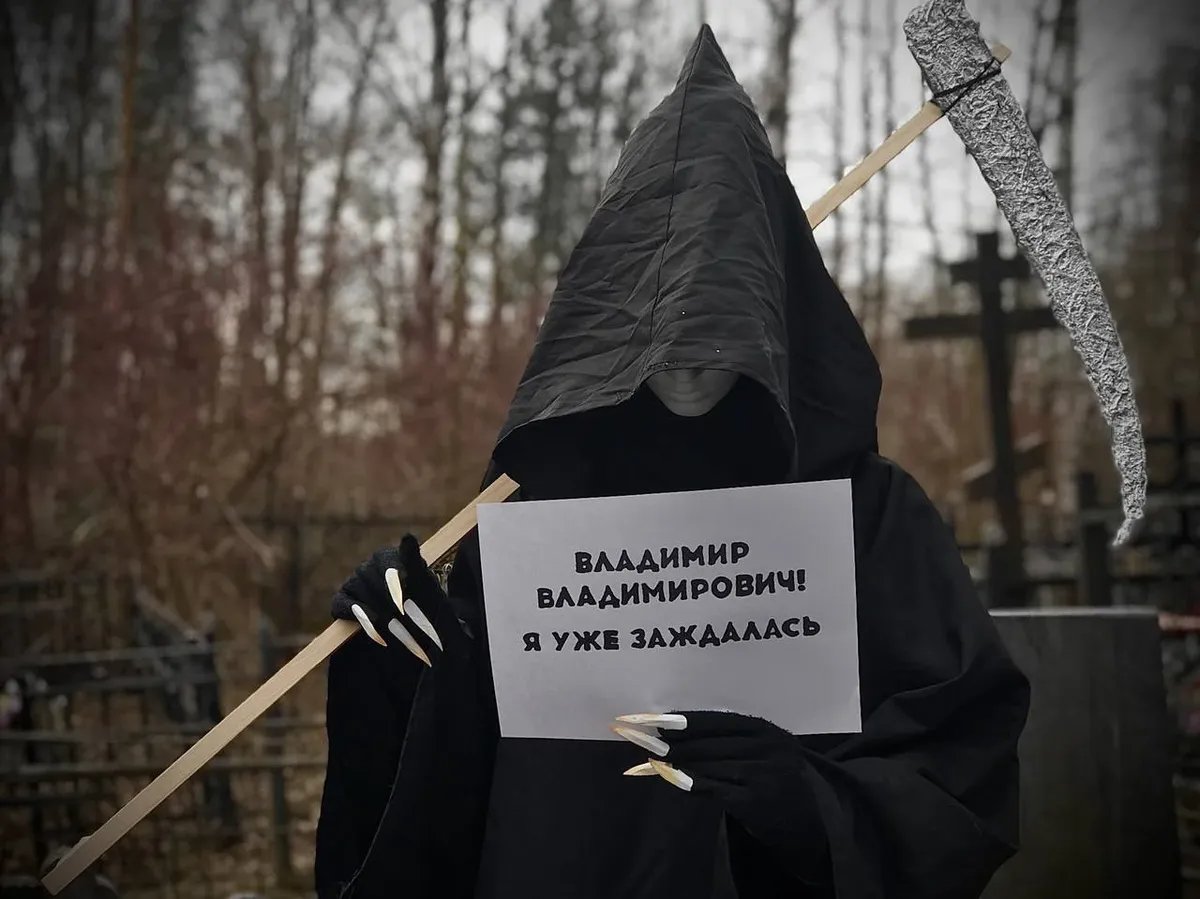
“Vladimir! I’m tired of waiting for you.” Source: vk.com/party_of_the_dead
In May, the Saint Petersburg section of PotD set up a performance called The Last Day of May. Activists posed with a poster reading “deathdeathMaydeathdeathdeathdeathdeathdeath”, having their faces covered. “The word Peace is becoming a taboo. War supporters wish this word could be erased, but they don’t call this war ‘a war’ either. <…> The dead wanted to speak, but their voices ‘discredit’ the authorities. In fact, their mere existence ‘discredits’ the authorities. The dead lie against any authorities,” reads a social media publication relating to the performance. There were performances in Georgia’s capital of Tbilisi, too.
“We believe that this war is a colossal crime, and there’s no way one can justify it.
The war must be stopped, and Russia must be defeated. This will be the best outcome. When this ridiculous pseudo-Empire falls, this is going to be a beautiful thing to witness. Everything we have been doing in the past six months is anti-war performances. This idea of necrophilic nature of Putin’s Russia started playing out in fresh colours when the war started. I believe the primary colours here are red and brown,” says Yevstropov. “Starting from day one there were so many texts by the pro-war people where they used dead people as reasons to justify the war. It seemed as the re-enactment of WW2, and there was combat in the same locations the Soviet army fought against Nazi Germany, so Russia’s soldiers are fighting Ukrainians on their territory, but at the same time they partake in a weird quasi-historic re-enactment of an older battle. Their point is that all the dead people who fought in the same locations are now side by side with them, and they somehow also support the current war. I think they believe the spirits of the Soviet combatants haunt the area with Z symbols on their helmets.
There was so much bloodshed out there starting from day one, and there were so many corpses there, too. All those corpses were left to rot in the battlefields, and no one would care to pick them up. We did a performance called Z-200 [on 7 March] at one of Saint Petersburg’s cemeteries (the performance was dedicated to the unknown death toll of both contracted servicemen and conscripted Russian soldiers — editor’s note). And, of course, there was a monstrous number of civilian casualties out there, too. I find it funny that they chose the letter Z as their symbol because the first word that comes to mind here is ‘zombie’. So, it appears to be some sort of zombie fascism now.”
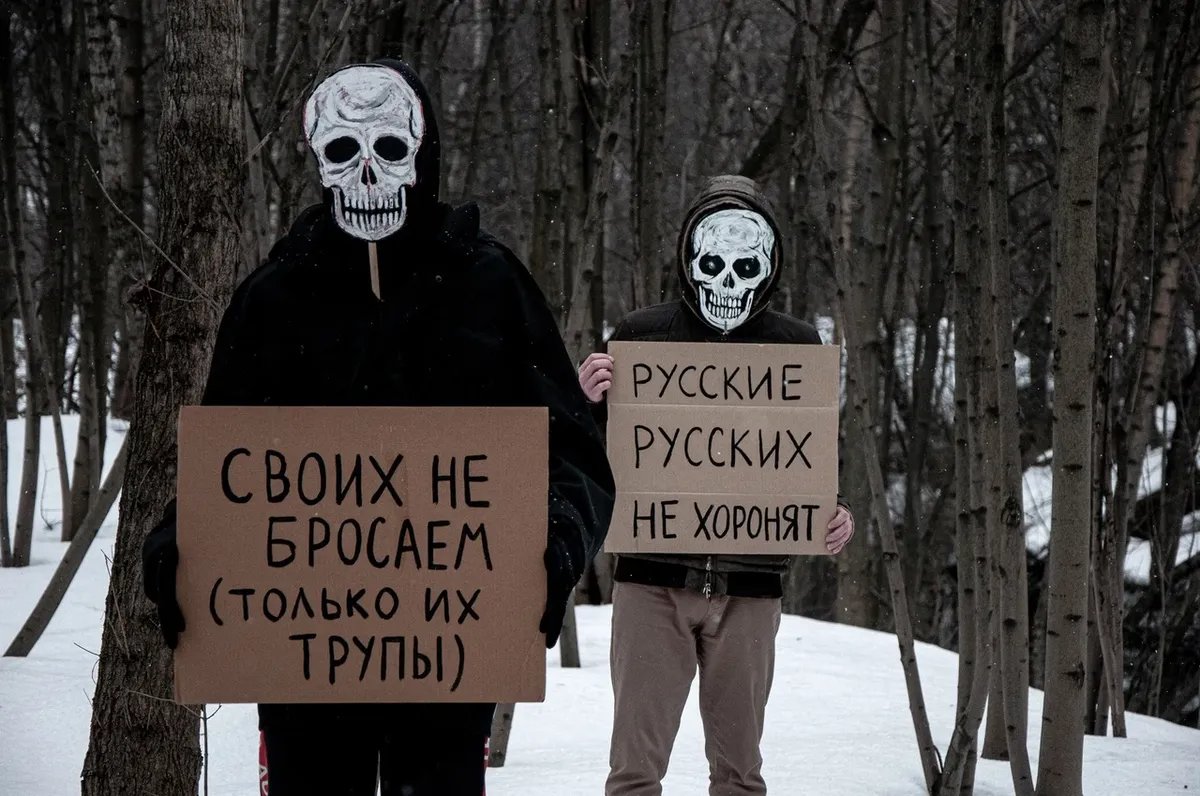
PotD’s performance Z-200.
We Never Leave Our Men Behind (Only Their Dead Bodies) / Russians do not bury Russians
Source: vk.com/party_of_the_dead
Yevstropov is not sure what the persecution against PotD’s activists will end up with. “By now, all the people who had their homes searched are officially witnesses, not suspects. It’s unclear whether they will face trial and go to prison or is this but an act of intimidation,” he says, adding that PotD has formed “a vigorous group of people” in Tbilisi where they continue setting up their artistic performances and go on with their “necropolitical activities.”
Join us in rebuilding Novaya Gazeta Europe
The Russian government has banned independent media. We were forced to leave our country in order to keep doing our job, telling our readers about what is going on Russia, Ukraine and Europe.
We will continue fighting against warfare and dictatorship. We believe that freedom of speech is the most efficient antidote against tyranny. Support us financially to help us fight for peace and freedom.
By clicking the Support button, you agree to the processing of your personal data.
To cancel a regular donation, please write to [email protected]
